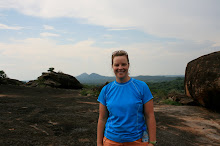I asked Grace about her experience with the war today. She had many stories to share, and I was so grateful to hear some of them. I will share a couple of them here as I feel that it makes the impact of this horrible conflict much more real.
She was a student at Sacred Heart, which is a boarding school in Gulu. She said that on several occasions, the LRA would send letters to the school saying that they were coming on a certain day. One day as the students were returning from their dinner, the teachers told them to go back to their dorms and get their blanket only. They were not to take anything but their blanket with them. The teachers then ushered the students to the convent close to the school. They were then locked inside. However since the convent is multiple stories, they could look out the window and see the destruction that the LRA caused. They witnessed them burning huts and killing people. Grace said that this happened several times while she was at Sacred Heart.
As an adult, Grace lived with her family in a village outside of Gulu. This is very common in the Acholi culture. She was teaching at Gulu SS at the time. One night, they saw that the hut where her two aunts lived was on fire. The LRA had set the hut on fire and locked the door from the outside. Her two aunts and 3 small children (her cousins) burned to death in this fire. Two other children were able to escape. The LRA set fire to 5 other huts around Grace’s families’ hut. She said that her family survived by the grace of God only. When the LRA turned their backs, Grace’s family ran out of their hut and hid in the bush for the rest of the night.
The next morning, her father told her, “I am old and have lived my life. You are young so you must go to the city and be safe.” Grace left that day to go to Gulu. For a while she slept in the bus park on the ground. A little while later, she found a room to rent, and so she and her family would come and sleep in this room at night. When they woke up, Grace would go to Gulu SS to teach. She would then walk to her home in the village for dinner because that is where their food was, and then the family would commute back to the room in Gulu. Grace and her family did this for 5 years. She said that they would take turns sleeping so someone was always listening out. If they heard gunfire, they knew they were okay because they could tell where the action was. However it was when there was silence that they became very nervous as that meant that they did not know where the LRA was. She said that dogs barking was another sign that the LRA was near. Gunfire was an every day occurrence.
I simply cannot imagine the fear that would be a part of this life. To me, it shows an incredible amount of strength that the Acholi have in the fact that they have been witness to true atrocities, and yet they have recovered and maintained their hope and kindness for others. We as Americans cannot understand this. For us 9/11 was life changing, but it was a one time event. Dealing with the LRA has been a 20+ year nightmare for these people. At some point, you would think that this would affect them mentally and emotionally, and I am sure it has. I think it helps them to tell their stories and for others to be witnesses to this horror. For Grace, all I had to do was ask.
Wednesday, July 1, 2009
Subscribe to:
Post Comments (Atom)

Being a witness is one of the most important things you can do for the Ugandan people. Thanks for sharing the story.
ReplyDelete